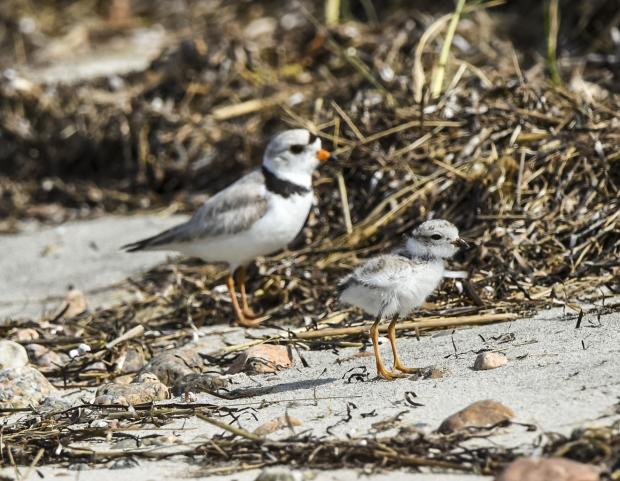Massachusetts provides habitat and supports:
-
over 15% of the world's population of Piping Plovers,
-
50% of the U.S. population of Roseate Terns, and
- some of the most important shorebird migration habitat along the Atlantic Coast.
Our breeding colonies of Common Terns and Least Terns are regionally significant. Species such as Laughing Gulls, American Oystercatchers, Black-crowned Night-Herons, and Snowy Egrets are of management concern because of limited abundance or declining populations, restricted distribution, or specialized habitat.
Massachusetts' coastal waters provide migration and winter habitat for hundreds of thousands of waterbirds, including Common Loons, Long-tailed Ducks, and Common Eiders.
Our salt marshes support significant breeding populations of Saltmarsh Sharp-tailed Sparrows, one of the highest priority species identified in recent bird conservation strategies for the northeastern United States.
Over the past 30 years, MassWildlife has worked with a growing number of cooperators to build and maintain effective conservation programs that monitor, protect, and restore populations and habitats of coastal waterbirds in Massachusetts.
MassWildlife works to
-
coordinate statewide conservation efforts and monitoring programs,
-
compile and disseminate census data,
-
restore and protect important coastal nesting sites,
-
provide technical assistance to landowners and other cooperators, and
-
use regulatory tools to protect breeding populations of state-protected rare species and their habitats.
Terns, Laughing Gulls, and Black Skimmers Population Monitoring Reports
Inventory of Terns, Laughing Gulls, and Black Skimmers Nesting in Massachusetts, 2024
Inventory of Terns, Laughing Gulls, and Black Skimmers Nesting in Massachusetts, 2023
Inventory of Terns, Laughing Gulls, and Black Skimmers Nesting in Massachusetts, 2022
Inventory of Terns, Laughing Gulls, and Black Skimmers Nesting in Massachusetts, 2021
Inventory of Terns, Laughing Gulls, and Black Skimmers Nesting in Massachusetts, 2020
Inventory of Terns, Laughing Gulls, and Black Skimmers Nesting in Massachusetts, 2019
Inventory of Terns, Laughing Gulls, and Black Skimmers Nesting in Massachusetts, 2018
Inventory of Terns, Laughing Gulls, and Black Skimmers Nesting in Massachusetts, 2017
Inventory of Terns, Laughing Gulls, and Black Skimmers Nesting in Massachusetts, 2016
Inventory of Terns, Laughing Gulls, and Black Skimmers Nesting in Massachusetts, 2015
Inventory of Terns, Laughing Gulls, and Black Skimmers Nesting in Massachusetts, 2014
Inventory of Terns, Laughing Gulls, and Black Skimmers Nesting in Massachusetts, 2013
Inventory of Terns, Laughing Gulls, and Black Skimmers Nesting in Massachusetts, 2012
Inventory of Terns, Laughing Gulls, and Black Skimmers Nesting in Massachusetts, 2011
Inventory of Terns, Laughing Gulls, and Black Skimmers Nesting in Massachusetts, 2010
Additional Resources
Piping Plover Population Monitoring Reports
Summary of 2024 Massachusetts Piping Plover Census Data
Summary of 2023 Massachusetts Piping Plover Census Data
Summary of 2022 Massachusetts Piping Plover Census Data
Summary of 2021 Massachusetts Piping Plover Census Data
Summary of 2020 Massachusetts Piping Plover Census Data
Summary of 2019 Massachusetts Piping Plover Census Data
Summary of 2018 Massachusetts Piping Plover Census Data
Summary of 2017 Massachusetts Piping Plover Census Data
Summary of 2016 Massachusetts Piping Plover Census Data
Summary of 2015 Massachusetts Piping Plover Census Data
Summary of 2014 Massachusetts Piping Plover Census Data
Summary of 2013 Massachusetts Piping Plover Census Data
Additional Resources
- Piping plover & Tern on-line data entry system
- U.S. Fish and Wildlife Service's Northeast Region's Piping Plover web site
- MA Piping Plover Habitat Conservation Plan
- Scott Melvin Memorial Fund
-
Open PDF file, 233.5 KB, Population Trends of Atlantic Coast Piping Plovers 1986-2006 (English, PDF 233.5 KB)
-
Open PDF file, 514.49 KB, Massachusetts Tern and Piping Plover Handbook (English, PDF 514.49 KB)
American Oystercatcher Population Monitoring Reports
The American Oystercatcher Working Group seeks to develop, support, and implement rangewide research and management efforts that promote the conservation of American Oystercatchers and their habitats. Read the most recent reports that summarize population monitoring data for American Oystercatchers breeding in Massachusetts:
Summary of 2011 Massachusetts American Oystercatcher Census
Contact
Online
Phone
Open M–F, 8 a.m.–4 p.m. (closed noon–12:30 for lunch)
North/Central/Western Massachusetts
Southeastern Massachusetts/Cape & Islands
